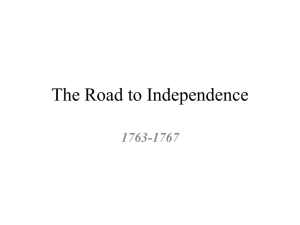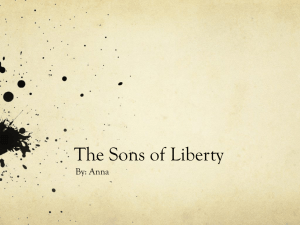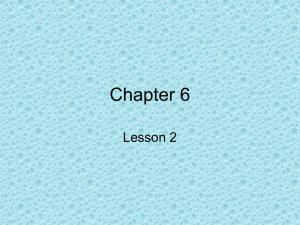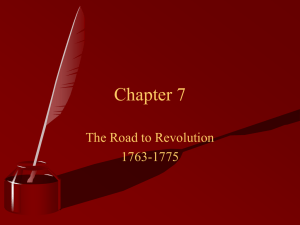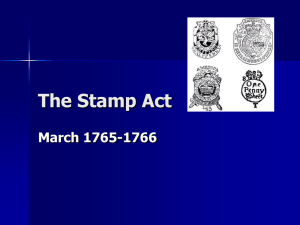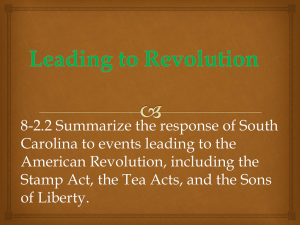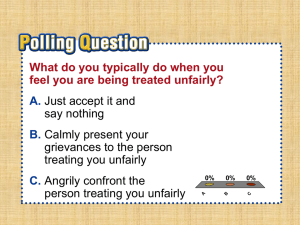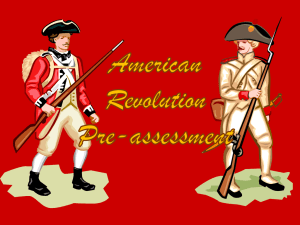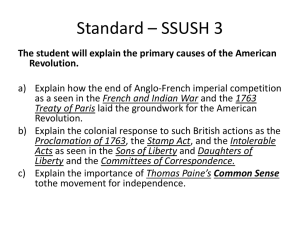Chapter 5 Quiz 3 review
advertisement
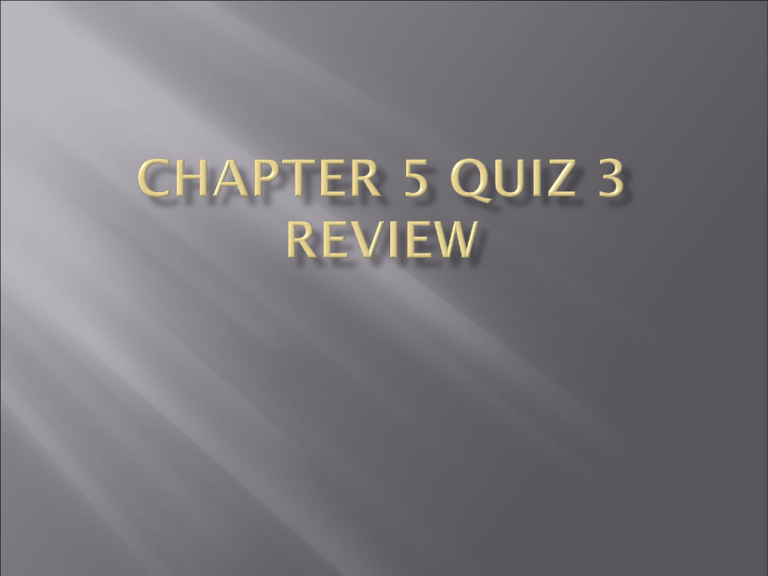
Nationalism grew in the American colonies for all of the following reasons except that The colonies were isolated from the help of Britain Private ownership of land gave the Americans a stake in their society All the colonists had a common heritage from Great Britain The colonies were accustomed to self-government All the colonists had a common heritage from Great Britain Which law was a direct threat against the colonists’ “power of the purse”? Proclamation Line Quartering Act Stamp Act Townshend Acts Townshend Acts The first successful example of colonial unity was the _________ Congress. Albany First Continental Stamp Act Sugar Act Stamp Act What colonial Congress attempted unsuccessfully to unite the colonies during the French and Indian War? Albany Cognress During what infamous incident did British redcoats kill five unarmed Patriots in 1770? Boston Massacre A) Samuel Adams B) John Dickinson C) George Grenville D) Patrick Henry ___ British minister who attempted to collect new taxes from the colonies C) George Grenville A) Samuel Adams B) John Dickinson C) George Grenville D) Patrick Henry ___ orator from Virginia who opposed British tyranny D) Patrick Henry A) Samuel Adams B) John Dickinson C) George Grenville D) Patrick Henry ___ leader of the Sons of Liberty A) Samuel Adams A) Samuel Adams B) John Dickinson C) George Grenville D) Patrick Henry ___ author of Letters from a Farmer in Pennsylvania to the Inhabitants of the British Colonies A) Samuel Adams A) boycott B) internal tax C) “power of the purse” D) Proclamation Line E) Quartering Act F) Sons of Liberty G) Stamp Act H) Sugar Act I) Townshend Acts ___ requirement that salaries, taxes and expenditures be scrutinized by elected officials C) “power of the purse” A) boycott B) internal tax C) “power of the purse” D) Proclamation Line E) Quartering Act F) Sons of Liberty G) Stamp Act H) Sugar Act I) Townshend Acts ___ ban on colonization beyond the Appalachian Mountains D) Proclamation Line A) boycott B) internal tax C) “power of the purse” D) Proclamation Line E) Quartering Act F) Sons of Liberty G) Stamp Act H) Sugar Act I) Townshend Acts ___ any tax on goods that are produced and consumed entirely within a country B) internal tax A) boycott B) internal tax C) “power of the purse” D) Proclamation Line E) Quartering Act F) Sons of Liberty G) Stamp Act H) Sugar Act I) Townshend Acts ___ British attempt to tax legal and commercial documents in the colonies G) Stamp Act A) boycott B) internal tax C) “power of the purse” D) Proclamation Line E) Quartering Act F) Sons of Liberty G) Stamp Act H) Sugar Act I) Townshend Acts ___ organization that opposed the tyranny of British ruleelected officials F) Sons of Liberty A) boycott B) internal tax C) “power of the purse” D) Proclamation Line E) Quartering Act F) Sons of Liberty G) Stamp Act H) Sugar Act I) Townshend Acts ___ requirement that the colonists help provision the British army E) Quartering Act A) boycott B) internal tax C) “power of the purse” D) Proclamation Line E) Quartering Act F) Sons of Liberty G) Stamp Act H) Sugar Act I) Townshend Acts ___ requirement that salaries, taxes and expenditures be scrutinized by elected officials A) boycott B) internal tax C) “power of the purse” D) Proclamation Line E) Quartering Act F) Sons of Liberty G) Stamp Act H) Sugar Act I) Townshend Acts ___ a repressive series of direct taxes on various colonial goods, such as glass I) Townshend Acts T/F the colonists responded to the Townshend Act with boycotts. True ___ John Dickinson and Patrick Henry were more upset about the high cost of the British taxes than the British right to tax. False
